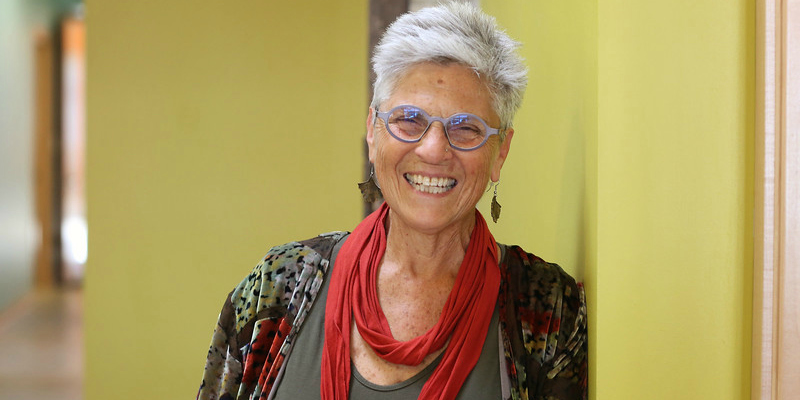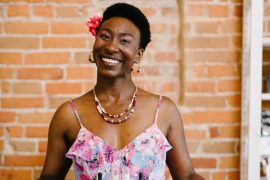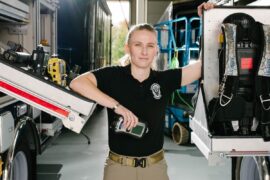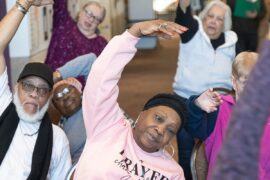On A Whim
It's how Efrat Livny has come to build an innovative space, a new nonprofit and community.No one can make change alone. Efrat Livny believes that to her core. She infuses that sentiment into Threshold, the colorful Atwood Avenue space she has created to nurture both entrepreneurs and community.
Threshold tenants include body work studios, including Livny’s own Open Circle Healing Arts, and health products store Plant Based Goods. Like-minded “affiliates,” other collaborators who attend, inform or host events in the space, include a storypreneur, community facilitator, marketing strategist, and design consultant and artist. For each, sharing and gathering wisdom and growing community are key.
Ten years ago Livny left a job directing the BioInformation Resources Facility for the UW’s Biotechnology Center and decided to focus on her art—Livny makes talking sticks that incorporate materials she’s gathered from around the world—and her body work practice. Later, when she had to close her studio, she thought it might be a sign— perhaps there was different work she was meant to do. About two years ago Livny saw the space where Threshold is now, and locked into it “on a whim,” seeing it as a place where she could practice art, body work—and maybe something else. Maybe something big.
And so the idea grew. “You cross this threshold to find a space to meet yourself and others,” says Livny, of the building. Enter the spare, modernized interior, and you’ll feel a palpable stirring, a rising up. It is open, with high ceilings. Light pours in and flows everywhere. Bright walls evoke the energy of possibility. This is, of course, by Livny’s artistic design to make Threshold, physically and in purpose, a hub: Retail and office spaces branch off central gathering spaces, and community is meant to both connect in to support them and radiate out from Threshold, like spokes in a wheel.
Livny has long focused on holism. In her journey through ovarian cancer—she was a co-founder of the Madison Gilda’s Club—her work as a cancer guide to others, and as a zero-balancing touch therapy practitioner, she continually asks how we can get fully aligned in our bodies and minds, our physical and mental spaces. Threshold embodies that concept as it aims to also merge both community and self-actualization.
“I wanted to do something beyond the mundane, that builds synergy between people,” she says. She wanted Threshold to be a place to expand, where you can do the kind of hard work that fills you up, not uses you up. As a society, Livny says, “We value doing, and not ‘being’ enough.” But, she adds, “Doing arises from being. When I’m being, the next thing just presents itself.”
“Threshold is a model for igniting a community conversation and projects,” Livny says. To build that synergy it hosts everything from workshops and classes to meetings, art shows, ceremonies, retreats and private events. Topics range from movement and painting to the art of conversation.
In fact, Livny’s ideas for Threshold were further shaped in conversations. Bert Stitt met Livny at a weekly circle, or conversation group. She shared her Threshold idea, then Stitt helped facilitate conversations around it. Former downtown development director for the State of Wisconsin, Stitt continues to facilitate strategic planning for communities and groups. He also is president of the Center for Community Stewardship, which helps nonprofits with their fundraising and money management.
“I think she’s fascinating in that she’s willing to invest her own money to create a space with the opportunity for it to find its own purpose and way,” says Stitt. “I like the daringness of that model and her willingness to step out and craft it and work it,” he says.
As part of letting Threshold’s purpose evolve, Livny launched the Soup for Syria conversation series. Curious to know what others thought and felt, she invited people to gather over soup to discuss the war-torn country’s wrenching humanitarian crisis. From those gatherings, Livny’s “next thing,” the something big, presented itself: Livny and her husband Ken Baun and now 80-some volunteers, launched Open Doors for Refugees, a nonprofit that aids local refugee resettlement agencies in helping displaced persons begin building their lives here.
“It started becoming impossible for me not to respond. It feels like the Holocaust
to me and I cannot sit back,” says Livny.
“I’m not from here, either. I’m not a refugee. I’m from Israel and a Jew,” she says. She thinks of the persecution her family and others suffered at the hands of the Nazis. “If the world hadn’t intervened, I wouldn’t be here. My father is a Holocaust survivor. His family did not survive.”
“Being integrated into a new place is hard,” says Livny, and that is why her Open Doors supports Lutheran Social Services and Jewish Social Services, the two Wisconsin resettlement organizations helping up to 150 refugees annually. Volunteers will aid in key areas such as orientation, translation, housing, transportation and helping refuges find employment and transportation. As this story was going to press, Open Doors volunteers were preparing the housing for a newly arrived Nepali family.
Mary Flynn, Lutheran Social Services refugee resettlement program manager for Madison and Milwaukee, says that by helping refugees continue to grow in skill, independence and comfort, Open Doors is “creating true opportunities for integration and multicultural appreciation.”
Committed to raising awareness and increasing public support, Livny says, “We are worried about the political climate in Wisconsin and the United States. The organization is open to the involvement of civic, religious and other organizations,” says Livny.
While the times are uncertain—Livny says she worries about the social “fears of Islamophobia, terrorism and the climate of damning generalizations”—the group is egalitarian, a-political and nonreligious. “We hope to prepare to welcome all refugees who come to Madison,” says Livny. “Our total emphasis is on humanity, and human beings.”
“Our hope,” says Livny, “is that once people are settled we can integrate them into Threshold events—not as people being helped, but as part of our community.”
“I’m not an activist. I start small on things that call me. This is world work, what we want to see happen,” she says of Threshold and Open Doors. “I know that if it wasn’t for this space and our focus on community I would not have been likely to take this on and it would not have had such a clear trajectory.”
“I just knew I had to leave the university. I just knew I needed to open Threshold,” says Livny. “In time your life tells you the story of why, and when you look back it makes perfect sense.”




